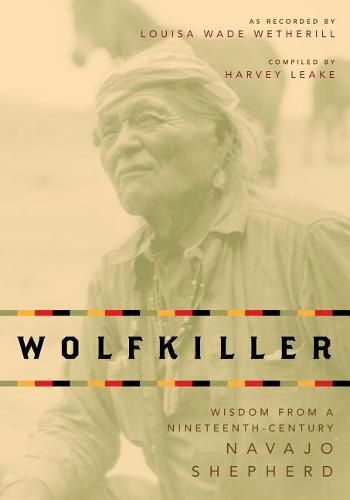Readings Newsletter
Become a Readings Member to make your shopping experience even easier.
Sign in or sign up for free!
You’re not far away from qualifying for FREE standard shipping within Australia
You’ve qualified for FREE standard shipping within Australia
The cart is loading…






This title is printed to order. This book may have been self-published. If so, we cannot guarantee the quality of the content. In the main most books will have gone through the editing process however some may not. We therefore suggest that you be aware of this before ordering this book. If in doubt check either the author or publisher’s details as we are unable to accept any returns unless they are faulty. Please contact us if you have any questions.
Fascinating history and compelling storytelling make Wolfkiller, the memoir of a Navajo shepherd man who lived in the Monument Valley region of the Southwest, a page-turning epic. In these stories compiled by Harvey Leake, Wolfkiller shares the ancient wisdom of the Navajo elders that was passed to him while a boy growing up near the Utah/Arizona border. Wolfkiller’s story was recorded and translated by pioneer trader Louisa Wade Wetherill, an unlikely pairing that came together when she moved to this remote area of southern Utah in 1906. Wetherill recognized that Wolfkiller was a man of exceptional character, with lessons and wisdom of the Navajo that deserved to be recorded and preserved for the benefit of future generations.
Over the course of many years, Wolfkiller told his stories to Wetherill who translated them into English. When the manuscript was completed in 1932, modern society was simply not ready for it. Rejected by publishers, the document languished in the family archives until today, long after Wolfkiller and Mrs. Wetherill were gone, it can now be recognized as a unique and profound book that speaks to modern culture’s compulsive rush away from nature.
Included are photographs of Wolfkiller and the Wetherills, all taken from about 1906 to 1926. More than forty other historical photographs are also included.
If Mrs. Wetherill could be persuaded to write on the mythology of the Navajos, and also on their present-day psychology-by which somewhat magniloquent term I mean their present ways and habits of thought-she would render an invaluable service. She not only knows their language; she knows their minds… . Theodore Roosevelt, after visiting the Wetherill trading post in 1913
$9.00 standard shipping within Australia
FREE standard shipping within Australia for orders over $100.00
Express & International shipping calculated at checkout
This title is printed to order. This book may have been self-published. If so, we cannot guarantee the quality of the content. In the main most books will have gone through the editing process however some may not. We therefore suggest that you be aware of this before ordering this book. If in doubt check either the author or publisher’s details as we are unable to accept any returns unless they are faulty. Please contact us if you have any questions.
Fascinating history and compelling storytelling make Wolfkiller, the memoir of a Navajo shepherd man who lived in the Monument Valley region of the Southwest, a page-turning epic. In these stories compiled by Harvey Leake, Wolfkiller shares the ancient wisdom of the Navajo elders that was passed to him while a boy growing up near the Utah/Arizona border. Wolfkiller’s story was recorded and translated by pioneer trader Louisa Wade Wetherill, an unlikely pairing that came together when she moved to this remote area of southern Utah in 1906. Wetherill recognized that Wolfkiller was a man of exceptional character, with lessons and wisdom of the Navajo that deserved to be recorded and preserved for the benefit of future generations.
Over the course of many years, Wolfkiller told his stories to Wetherill who translated them into English. When the manuscript was completed in 1932, modern society was simply not ready for it. Rejected by publishers, the document languished in the family archives until today, long after Wolfkiller and Mrs. Wetherill were gone, it can now be recognized as a unique and profound book that speaks to modern culture’s compulsive rush away from nature.
Included are photographs of Wolfkiller and the Wetherills, all taken from about 1906 to 1926. More than forty other historical photographs are also included.
If Mrs. Wetherill could be persuaded to write on the mythology of the Navajos, and also on their present-day psychology-by which somewhat magniloquent term I mean their present ways and habits of thought-she would render an invaluable service. She not only knows their language; she knows their minds… . Theodore Roosevelt, after visiting the Wetherill trading post in 1913